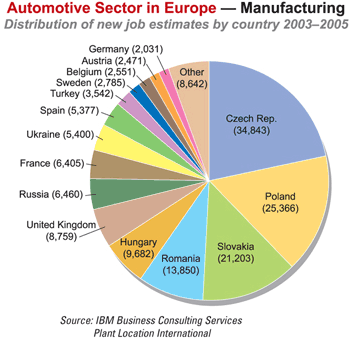EUROPEAN AUTOMOTIVE INDUSTRY
Hyundai/Kia … Stars on the Rise
While some suggest that global automotive manufacturing shifts as companies seek ways to build better- faster- cheaper, others say that continental location changes have more to do with the fickle whims of consumers. As Asian car buyers snap up European- made cars, companies like BMW are building more capacity near this large and growing market. Demand for big foreign- made cars continues to climb in China, where newly wealthy consumers are buying, and where city fathers in some 80 metros encourage the trend, imposing ordinances that make it a traffic violation to drive the small, dumpy, locally manufactured cars commonly seen on streets.
 |
The Chinese government continues to encourage the exodus to Asia and new foreign investment by imposing what EU negotiators say are overly high tariffs on automotive components exported from Europe and bound for China- based assembly plants.
Meantime, Europeans seem to have just discovered Asian cars.
"Until now, the Asian car makers did not understand the design and poetry that European car buyers were looking for. Now, they have learned how to do it, and they are doing what Renault and Peugeot have done, only for a lower price," explains European automotive analyst Thomas Ryard of World Markets Research Center. Europeans are buying Asian cars at a faster pace now than even four years ago.
In 2001, western Europeans bought 1.5 million Japanese cars, and around 300,000 Korean cars. Today, according to figures compiled by Datamonitor, consumer demand has pushed sales of Japanese cars to the two million mark, while sales of Korean cars are edging toward the one million mark. Kia is the fastest growing carmaker in Europe, with sales growing by almost 50 percent in 2005 over 2004. Company executives say that there are months-long waiting lists for some models.
"There is no doubt about the increasing demand for Korean and Japanese brands in Western Europe," says Datamonitor automotive analyst Jugoslav Stojanov. "As European car buyers are growing more convinced in the quality and brand image of the likes of Hyundai and Kia, the Korean manufacturers are investing in manufacturing facilities in Europe." Stojanov notes that the Korean firms moving into Europe are all looking east. "For the obvious reasons, the ones who are setting their foot in Europe now are doing that in Central and Eastern Europe. Kia has entered Slovakia. Hyundai is expected to announce its major investment in the Czech Republic [soon]."
In fact that announcement came in early spring, but on nearly the same day Hyundai's expansion plans may have hit a snag because of the announcement of the South Korean Special Prosecutor's investigation of Hyundai. The still- evolving story involves accusations of bribery against a Hyundai lobbyist, who used Hyundai- fed slush funds to influence senior government officials associated with domestic economic development, incentives packages and land- use decisions. An official with Hyundai's Glovis logistics subsidiary was arrested, and several high-level Kia and Hyundai executives were temporarily forbidden from leaving South Korea.
Some analysts say that the events are just a national blip on Hyundai's international radar screen. "European customers don't really care what's going on in South Korea, They see a good value for a car, and they are going to buy it," Ryard says. He speculates that the most recent setbacks in Korea, while creating an image problem in the company's home country, will only speed up the firm's ambitious globalization plans. "They want to reduce their dependence on South Korea, because their market is saturated, and there are significant work force issues – frequent strikes and rising wages. This will spur the move."
Multiple queries from Site Selection to Hyundai officials went unanswered at press time, but CzechInvest CEO Tomas Hruda replied in mid-April that "as far a we know, there are no signals that the contract signing should be postponed" for the $1.2-billion project in Nosovice. "The May term of signing is still most probable."
Some reports spoke of an agreement with rival nation Slovakia on a new road between the new Kia plant there and the forthcoming Hyundai plant in Novosice, but Hruda said that is not part of the project.
"However," he said, "in case of such a need, we are prepared to deal with Slovakia and discuss mutual agreement on the construction."

